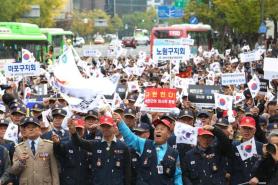
[Arthur I. Cyr]
KENOSHA, Wisconsin -- The Vietnam War ended officially on January 27, 1973, with the signing of the Paris Peace Accords. The governments of North Vietnam, South Vietnam, and the United States, plus the revolutionary National Liberation Front (NLF, which included the military Viet Cong) were parties to the agreement.
The 50th anniversary of the event provides a benchmark for analysis. Intense, angry division among Americans over the war tore our country apart for many years.
Fading of that is a blessing. Yet accurate assessment of lessons can remain elusive, clouded by misconceptions and passage of time.
Talented journalist Barton Swaim has conducted an informative interview with former Senator Jim Webb (D-VA), published in the Wall Street Journal on January 21-22. Webb served in Vietnam combat as a Marine Corps officer, was wounded and received the Navy Cross, Silver Star, Bronze Star and Purple Heart, among other medals.
Regarding military combat, Webb knows what he’s talking about.
Webb emphasizes that most Vietnam Veterans are proud of their service, in contrast to dominant popular imagery. Defense Secretary Robert McNamara with his civilian quantitative analysts, and the highly organized well-funded anti-war movement, are blamed for the ultimate failure of U.S. efforts to preserve South Vietnam.
Webb also emphasizes assassination teams sent to the South by Hanoi, targeting in particular village chiefs and social workers, and cites French journalist and scholar Bernard Fall’s important, reliable work.
McNamara, an extremely aggressive statistician-manager, fixated on quantitative measures of progress. Attrition was the order of the day; enemy body counts and weapons captured the measure of progress.
Body counts were often inflated. Pentagon politics and public relations corrupted information. As that war became ever more frustrating and controversial, critics seized on this problem. The aftermath of the war included a bitter lawsuit between Vietnam commander General William Westmoreland and CBS News, which he accused of a biased documentary on the bloody numbers game.
But there is a more subtle and profound problem with the body-count approach. During Vietnam, U.S. Army iconoclasts such as Colonel John Paul Vann argued that the McNamara measures were based on false premises. Given the enormous scale of American firepower, increasing body and weapons totals simply meant the enemy was growing in numbers. There were more targets to kill.
During McNamara’s tenure at the Pentagon, officers who questioned the approach were not only summarily rejected, their careers were in jeopardy. Vann, ultimately vindicated, became extremely influential as a civilian official of the Agency for International Development, the important but politically unpopular U.S. foreign aid program.
Vann, true warrior, still carried a weapon and ran military operations, literally unable to let go of this passion. He was killed in a helicopter crash late in the war.
Not surprisingly, the Vietnam War had profound impacts on the United States military, especially the Army. During the Eisenhower administration, pressures grew steadily not only to increase military spending, but to use our forces overseas more aggressively.
Consequences included a large increase in defense spending under the new Kennedy administration. President Kennedy and influential advisers became fascinated with notions of counterinsurgency. In Vietnam, however, the fighting ultimately became conventional.
War is unpredictable.
The same day the Paris Peace Accords were signed, Secretary of Defense Melvin Laird announced that the draft was ended, instituting the all-volunteer military. In consequence, our military forces can more easily be deployed into potentially dangerous situations.
In other words, involvement in wars became more likely.
Learn more: Bernard Fall, "The Two Viet-Nams."
Copyright ⓒ Aju Press All rights reserved.



